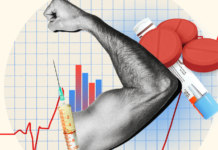What are Anabolic Steroids?
Anabolic steroids are synthetic substances that are similar to the male hormone testosterone. They are commonly used to promote muscle growth and enhance athletic performance. These substances are typically taken in the form of pills, injections, or creams.
Anabolic steroids have gained significant attention in recent years due to their potential for abuse and the numerous health risks associated with their misuse. While these substances can have legitimate medical uses, such as treating hormonal imbalances or aiding in the recovery of certain medical conditions, they are often misused by athletes and bodybuilders seeking to gain a competitive edge or achieve a more muscular physique.
The use of anabolic steroids for non-medical purposes is illegal in many countries, including the United States, where they are classified as controlled substances. Despite their legal status, the illicit use of these drugs continues to be a prevalent issue, particularly within the realm of professional sports.
The allure of anabolic steroids lies in their ability to increase muscle mass and strength, improve endurance, and reduce recovery time between workouts. These effects are achieved by enhancing protein synthesis within the body, leading to an increase in muscle tissue growth. Additionally, anabolic steroids can also increase the production of red blood cells, which improves oxygen delivery to the muscles and enhances overall performance.
However, the use of anabolic steroids comes with a plethora of potential risks and side effects. These substances can disrupt the body’s natural hormone balance, leading to a range of adverse effects on both physical and psychological health. Some common side effects include acne, hair loss, liver damage, cardiovascular problems, mood swings, aggression, and infertility.
Furthermore, the misuse of anabolic steroids can have long-term consequences. Prolonged use of these substances can result in irreversible damage to the liver, kidneys, and cardiovascular system. It can also lead to hormonal imbalances, which can have a cascading effect on various bodily functions.
In conclusion, anabolic steroids are synthetic substances that mimic the effects of testosterone. While they can have legitimate medical uses, their misuse for non-medical purposes is illegal and can have serious health consequences. The allure of improved athletic performance and muscle growth should not overshadow the potential risks and side effects associated with these substances. It is crucial for individuals to prioritize their long-term health and well-being over short-term gains and seek safer and legal alternatives for achieving their fitness goals.
Who Uses Anabolic Steroids?
Anabolic steroids are predominantly used by athletes, bodybuilders, and individuals who aim to improve their physical appearance. These substances are often sought after by those looking to increase muscle mass, strength, and endurance. However, it is important to note that the use of anabolic steroids is illegal without a prescription in many countries.
Athletes from various sports have been known to use anabolic steroids in an attempt to enhance their performance. This includes professional athletes who compete at the highest level, as well as amateur athletes who participate in recreational sports. The desire to gain a competitive edge and excel in their respective fields often drives athletes to turn to these performance-enhancing substances.
Bodybuilders, in particular, are known for their use of anabolic steroids. These individuals engage in intensive weightlifting and resistance training to build muscle and sculpt their bodies. Anabolic steroids can help bodybuilders achieve their desired physique by promoting muscle growth and reducing body fat. The use of these substances is prevalent in the bodybuilding community, despite the potential health risks associated with their misuse.
Moreover, anabolic steroids are also popular among individuals who simply want to improve their physical appearance. Many people aspire to have a well-defined and muscular physique, and anabolic steroids are seen as a shortcut to achieving these goals. These individuals may not necessarily be athletes or bodybuilders but are motivated by the desire to look more attractive and confident.
It is worth mentioning that the use of anabolic steroids is not limited to a specific gender or age group. Both men and women have been known to use these substances, although they are more commonly used by men due to their potential for causing masculinizing effects. Additionally, while anabolic steroid use is more prevalent among younger individuals, older adults seeking to combat the effects of aging and maintain their vitality may also turn to these substances.
Despite the allure of improved physical performance and appearance, it is crucial to recognize the potential dangers and risks associated with anabolic steroid use. Misuse of these substances can lead to a range of adverse effects, including liver damage, cardiovascular problems, hormonal imbalances, and psychological disturbances. Therefore, it is essential for individuals considering the use of anabolic steroids to weigh the potential benefits against the potential risks and to seek guidance from medical professionals.
How Anabolic Steroids Work
Anabolic steroids work by binding to androgen receptors in the body, which are responsible for mediating the effects of testosterone. By binding to these receptors, anabolic steroids can increase protein synthesis, leading to an increase in muscle mass and strength.
Additionally, anabolic steroids can also have androgenic effects, which are responsible for the development of secondary sexual characteristics such as facial hair and deepening of the voice.
When anabolic steroids are introduced into the body, they travel through the bloodstream and attach to specific androgen receptors located in various tissues, including muscles and bones. Once attached, these steroids activate the receptors, triggering a series of biochemical reactions that ultimately result in increased protein synthesis.
Protein synthesis is the process by which cells build new proteins, and it plays a crucial role in muscle growth and repair. Anabolic steroids enhance this process by increasing the production of messenger RNA (mRNA), which carries the genetic instructions for protein synthesis.
Furthermore, anabolic steroids also decrease the rate of protein breakdown in the muscles. This means that muscles are able to retain more protein, leading to increased muscle mass and strength over time.
Aside from their anabolic effects, anabolic steroids also have androgenic properties. Androgens are hormones responsible for the development and maintenance of male characteristics. When anabolic steroids bind to androgen receptors in certain tissues, they stimulate the production of proteins that are involved in the development of secondary sexual characteristics.
In males, this can result in the growth of facial hair, deepening of the voice, and increased muscle mass. In females, the androgenic effects of anabolic steroids can lead to the development of masculine features, such as a deepened voice and increased body hair.
It’s important to note that while anabolic steroids can have significant effects on muscle growth and physical performance, they also come with a range of potential side effects. These can include liver damage, cardiovascular problems, hormonal imbalances, and psychological effects such as mood swings and aggression.
Therefore, the use of anabolic steroids should always be approached with caution and under the guidance of a medical professional.
How Anabolic Steroids Affect the Body
While anabolic steroids can have positive effects on muscle growth and athletic performance, they also come with a range of potential side effects. These side effects can vary depending on the specific steroid used, the dosage, and the duration of use.
Some common side effects of anabolic steroid use include:
- Liver damage: Prolonged use of anabolic steroids can put excessive strain on the liver, leading to liver damage. This is because the liver is responsible for metabolizing and eliminating toxins from the body, including steroids. Over time, the liver may become overwhelmed and unable to function properly, resulting in liver dysfunction or even liver failure.
- Cardiovascular problems: Anabolic steroids can have a negative impact on cardiovascular health. They can increase the levels of bad cholesterol (LDL) and decrease the levels of good cholesterol (HDL), which can lead to the development of atherosclerosis, a condition characterized by the buildup of plaque in the arteries. This can increase the risk of heart attacks, strokes, and other cardiovascular complications.
- Hormonal imbalances: Anabolic steroids are synthetic versions of the male hormone testosterone, and their use can disrupt the body’s natural hormone balance. This can lead to a range of hormonal imbalances, including decreased production of natural testosterone, which can result in testicular atrophy, reduced sperm production, and infertility. In addition, anabolic steroids can cause an increase in estrogen levels in men, leading to the development of breast tissue (gynecomastia).
- Acne: Anabolic steroids can stimulate the sebaceous glands in the skin, leading to an increase in oil production. This can result in the development of acne, particularly on the face, chest, and back. Severe acne can be painful and leave permanent scars.
- Mood swings: Anabolic steroids can have a significant impact on mood and behavior. Some users may experience increased aggression, irritability, and even violent outbursts, commonly referred to as “roid rage.” On the other hand, some individuals may experience mood swings, including depression and anxiety.
- Aggression: Anabolic steroids have been associated with an increase in aggressive behavior, both in and out of the gym. This can manifest as heightened irritability, anger, and even violent tendencies. It is important to note that not all users will experience these effects, and individual responses may vary.
- Infertility: Prolonged use of anabolic steroids can disrupt the normal functioning of the reproductive system, leading to infertility in both men and women. In men, it can cause testicular shrinkage, decreased sperm count, and reduced sperm motility. In women, it can disrupt the menstrual cycle and cause fertility issues.
It is important to note that the long-term effects of anabolic steroid use are not yet fully understood, and further research is needed to fully assess the potential risks. Additionally, it is crucial to consult with a healthcare professional before using anabolic steroids to ensure safe and responsible use.
Anabolic Steroid Use and the Law
The use of anabolic steroids without a prescription is illegal in many countries, including the United States. In these countries, anabolic steroids are classified as controlled substances due to their potential for abuse and the associated health risks. The laws surrounding anabolic steroid use vary from country to country, but they generally aim to protect public health and prevent the misuse of these substances.
In the United States, anabolic steroids are classified as Schedule III controlled substances under the Controlled Substances Act. This means that the possession, distribution, and use of anabolic steroids without a valid prescription is a federal offense. Individuals found to be using anabolic steroids without a prescription can face legal consequences, including fines and imprisonment. The severity of these consequences can vary depending on factors such as the quantity of steroids involved and the individual’s prior criminal record.
Furthermore, athletes who test positive for the use of anabolic steroids can face serious repercussions in the world of sports. Many sports organizations, including the International Olympic Committee and major professional sports leagues, have strict anti-doping policies in place. Athletes who are caught using anabolic steroids can be banned from competing in sports events, stripped of their titles and records, and face damage to their reputations.
It is important to consult with a healthcare professional before considering the use of anabolic steroids, as they can have serious health implications and legal ramifications. Anabolic steroids can cause a range of adverse effects on the body, including liver damage, cardiovascular problems, hormonal imbalances, and psychiatric disorders. Additionally, the non-medical use of anabolic steroids can lead to dependence and addiction.
By understanding and respecting the laws surrounding anabolic steroid use, individuals can make informed decisions about their health and well-being. It is crucial to prioritize the use of legal and safe methods for achieving fitness and athletic goals, such as proper nutrition, exercise, and guidance from qualified professionals.


























